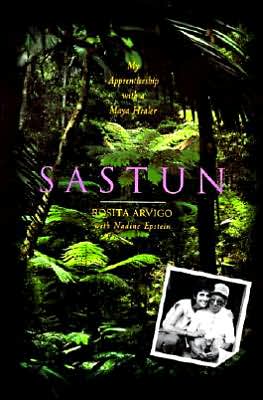Sastun: One Woman's Apprenticeship with a Maya Healer
The compelling drama of American herbologist Rosita Arvigo's quest to preserve the knowledge of Don Elijio Panti, one of the last surviving and most respected traditional healers in the rainforest of Belize.
Search in google:
The compelling drama of American herbologist Rosita Arvigo's quest to preserve the knowledge of Don Elijio Panti, one of the last surviving and most respected traditional healers in the rainforest of Belize.
Chapter One\ Linden Flowers, Basswood Flor de Tilo\ Tilia americana\ \ \ Linden flowers and leaves are a traditional home remedy in many\ parts of the world for coughs, colds, and sore throats. Generations\ of Central Americans have prized its effectiveness as\ a mild, pleasant-tasting sedative tea for children\ and the elderly and infirm.\ It felt like a hot, sticky day in my hometown of Chicago. I could have been catching a cool breeze on Lake Michigan, but I was on West Street in San Ignacio of western Belize, and the only relief was the stingy breeze from the Macal River. With a bag full of mangoes and papayas, I stepped out of our clinic onto the veranda and looked out into the hot, dusty bustle. I put down the bag and fanned myself, feeling too restless to sit down. A wave of homesickness washed over me.\ I loved San Ignacio, which is the largest town in western Belize and only ten miles from the Guatemalan border, but today, the sweltering, unforgiving heat; the loud, blaring punta rock music popular in Belize; the row of shops along a narrow, dusty street; the mangy, threatening dogs; and the pungent, powerful smells of everyday life seemed too foreign.\ My husband, Greg, my daughter, Crystal, and I had been in Belize for two years. Our dream farm, six miles away by dugout canoe, was becoming a nightmare. It was a never-ending struggle to keep the Jungle from encroaching on the two thatch huts we had built and called home. Our effort to transform a muddy, burned-out clearing into a tropical homestead was not the fulfilling experience wehad imagined. We were seriously contemplating returning to Chicago. The indecision about whether to leave or hang on was frustrating.\ I hated to quit, especially when I felt in my heart that we belonged in Belize. We were eking out a living from our natural healing practice, but even the herbs we'd brought from Chicago, which were our livelihood, were beginning to decompose from the unrelieved humidity. There was no way to replenish our supply. Clearly, our time was running out.\ Shielding my eyes from the sun with a flattened palm I saw a diminutive old man sitting on our wait bench in the cool shadows. He had an air of learned patience. He seemed content to sit and watch the people pass by, peering at them with interest. His clothes were patched, badly stained, and threadbare, but freshly laundered.\ "Buenos dias, señor," I said, stretching out my hand to greet him. He seemed startled and took a moment to compose himself before rising to greet me. His slight but sinewy frame barely reached my chin. Age had bent him slightly over at the waist, yet he had the bearing and presence of a much younger man.\ He pushed back his sweat-stained yellow Pepsi cap, and I saw that his features were identical to those of the stone carvings at the ruins of the ancient Maya city-states such as nearby Caracol and Tikal. His face was a haunting rendition of the classic Maya profile: the long, hooked nose, the flat forehead, the drooping lower lip, and the upturned eyes.\ Taking both my hands in his, he smiled warmly, looking into my eyes and speaking in a raspy voice, "Mucho gusto. Mucho gusto." The feel of his tough, leathery hands conjured up the image of an experienced bushmaster slicing expertly through a tangle of wild vines. It was obvious the old man had spent decades in the jungle.\ "Won't you come in and sit?" I suggested, wondering if he had come to see me as a patient.\ "A friend left me here to wait for him while he runs an errand. Someone told me I might like to meet you," he explained in Spanish. "You are interested in the healing plants. Is this so?" he asked, carefully setting his stiff legs into a chair in the treatment room. He accepted my outstretched hand, and I helped him into the seat.\ I explained that I was a natural healer, with a doctor's degree in naprapathy, "I use herbs, massage, and diet therapies in my healing practice."\ He was straining his eyes to see what was in the quart-sized glass jars on the shelves behind us. "What are those?" he inquired.\ "My herbs," I explained. "Would you like to see which ones I use in my work?" I pulled down one of the jars, preparing to launch into a primer about herbal medicine. But the old man stopped me and said, "First, let me introduce myself. My name is Elijio Panti of San Antonio Village not far from here, and I...\ As soon as I heard his name, I almost dropped the glass jar. I had been about to give a plant lesson to the best-known Maya medicine man in Central America.\ Great and terrible stories circulated about this old Maya doctor-priest. Some spoke of near-miraculous healings, cured diseases, and numerous lives clutched from death's bony hand. Others claimed he was a lecherous old man, prone to molesting unsuspecting women, a drunk, a witch, a sorcerer, and a perpetrator of evil spells on innocent people.\ I knew virtually nothing about local witchcraft beliefs except for gossip. Rumor had it that Elijio (pronounced Ay-lee-hee-o) Panti was from a family of black magicians. His father, it was said, was an obeha man, a practitioner of black magic who enchanted hundreds of women to be his lovers. I had heard that Panti also enchanted women, both for his own pleasure and for patients who paid for the service.\ But as I looked down into the old man's gentle eyes, I found it hard to believe he was evil. I felt it more likely he was misunderstood, as healers often are. I too had been called a witch and had been accused of fanciful deeds.\ \ Sastun. Copyright © by Rosita Arvigo. Reprinted by permission of HarperCollins Publishers, Inc. All rights reserved. Available now wherever books are sold.








